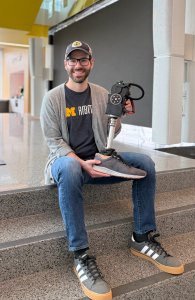Presented By: Michigan Robotics
Increasing Practicality of Quasi-Direct Drive Robotic Prosthetic Legs through Control and Design Optimization
Robotics PhD Defense, Ross Cortino

Chair: Robert D. Gregg
Zoom Link:
https://umich.zoom.us/j/95234083146
Abstract:
Conventional passive microprocessor-controlled knee and ankle prostheses improve lower-limb amputee mobility and quality of life through their simple hand-tuned control and lightweight mechanical design. However, these devices are unable to perform positive work at the knee, limiting the ability of the user to perform activities like walking, stair ascent, and sit-to-stand. Powered prosthetic devices can address these limitations by providing controlled positive work at the joint and allowing for active control of joint position, reducing compensatory behaviors and opening up the door to biomimetic control approaches. Despite these benefits, powered prostheses are not ubiquitous due to weight, ergonomics, and cost, as well as the lack of control architectures that reduce the need for user-specific tuning and give a sense of volition.
In this presentation, I focus on overcoming these limitations to the design and control of transfemoral prostheses through the development of data-driven, indirect-volitional controllers for stair locomotion and stair-walk transitions, and the design optimization and implementation of a light-weight, highly backdriveable knee prosthesis. Through this work, I successfully unify a field-leading hybrid kinematic impedance control framework across multiple activities of daily living. I also construct and validate a quasi-direct drive knee prosthesis, weighing ~100 grams less than the leading consumer powered knee prosthesis with double the torque-density.
By creating data-driven, indirect-volitional control paradigms that can achieve biomimetic biomechanics for multiple activities of daily living, and developing a light-weight, quasi-direct drive knee prosthesis capable of biomimetic biomechanics, I aim to showcase the benefits and potential of fully-powered prostheses, breaking down the barriers to their real-world use.
Zoom Link:
https://umich.zoom.us/j/95234083146
Abstract:
Conventional passive microprocessor-controlled knee and ankle prostheses improve lower-limb amputee mobility and quality of life through their simple hand-tuned control and lightweight mechanical design. However, these devices are unable to perform positive work at the knee, limiting the ability of the user to perform activities like walking, stair ascent, and sit-to-stand. Powered prosthetic devices can address these limitations by providing controlled positive work at the joint and allowing for active control of joint position, reducing compensatory behaviors and opening up the door to biomimetic control approaches. Despite these benefits, powered prostheses are not ubiquitous due to weight, ergonomics, and cost, as well as the lack of control architectures that reduce the need for user-specific tuning and give a sense of volition.
In this presentation, I focus on overcoming these limitations to the design and control of transfemoral prostheses through the development of data-driven, indirect-volitional controllers for stair locomotion and stair-walk transitions, and the design optimization and implementation of a light-weight, highly backdriveable knee prosthesis. Through this work, I successfully unify a field-leading hybrid kinematic impedance control framework across multiple activities of daily living. I also construct and validate a quasi-direct drive knee prosthesis, weighing ~100 grams less than the leading consumer powered knee prosthesis with double the torque-density.
By creating data-driven, indirect-volitional control paradigms that can achieve biomimetic biomechanics for multiple activities of daily living, and developing a light-weight, quasi-direct drive knee prosthesis capable of biomimetic biomechanics, I aim to showcase the benefits and potential of fully-powered prostheses, breaking down the barriers to their real-world use.